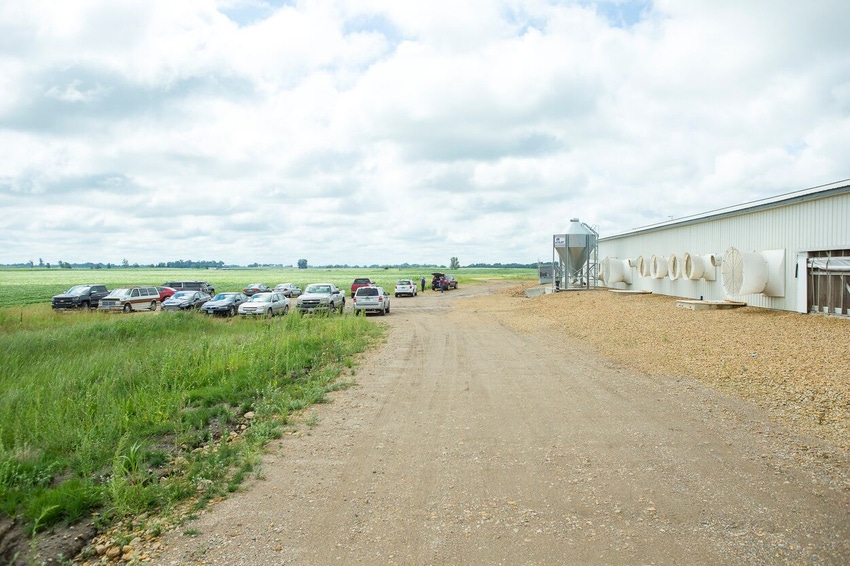Creating a successful team, culture on the sow farm
Communication, respect, emotional intelligence and training are key.

In 2019, when Max Klepper was presented with the opportunity to manage a brand new 7,500-head sow farm and 18 employees in northwest Iowa, the farm manager with Iowa Select Farms jumped at the chance — after all it couldn't be much different from his current position managing a 4,200-head sow farm for the pork production system.
"I couldn't have been any further incorrect," says Klepper, who recently shared his experience during the 2022 Iowa Swine Day. "The thing I underestimated was the fact that I left a team that was established, a very successful team already, to go to a new farm, with new staff, most that were new to the swine industry to begin with, and that was a huge challenge."
He credits his participation in a program called the "People Care Leadership Program" in easing the transition. The program is designed to help new leaders continue to grow, develop a mindset or skill set to lead themselves, and to be successful at leading others.
Constant communication
The first area Klepper says his new team focused on was communication.
"Every morning we'll sit down, and we'll communicate the game plan for the day. If we have good communication for the day, we're probably going to have a smooth, efficient day. We might have issues arise, but we can still mitigate the impact of those, maybe not let them ruin our day," Klepper says. "The opposite can be said, if we start the day with poor communication, even a minor issue might really throw a dent in our day."
Communication between departments also needs to constant. While breeding and farrowing may be two different departments on the farm, they are still one team. He also recognized early on the more his team communicated, the more organized they could be.
"A principle that we like to use is the 'big rocks, small rocks' principle," Klepper says. "Every morning, my team and I will sit down, and we'll plan out the big rocks, the small rocks. The big rocks being the pillars of our day, the weaning process, maybe we're getting gilts in that day, maybe sending culls out, maybe just washing the room. Those are all big parts of our day, the pillars of our day. And we want to make sure we focus our time and efforts on those, and make sure we're addressing those right off the bat."
Feedback is also important in terms of communication. While providing positive feedback to employees boosts morale, Klepper acknowledges not all feedback will be positive. There are also times where it may be impossible to find something positive to say.
"If I have an employee that doesn't call or doesn't show up, I'm probably not going to say a whole lot of positive things in that conversation," Klepper says. "But the important thing here is to not avoid it. Through trial and error, I found out that you're best off just facing it head on. If you avoid that conversation once, that issue is going to happen again."
Finally with any kind of communication, active listening throughout the team needs to be expected.
People care
The next concept Klepper implemented at the new farm was "people care." This means respecting employees, their values and cultures; having an emotional intelligence or understanding employees and what drives them; and training.
"We like to say that our employees start with our respect," Klepper says. "They don't necessarily need to come in and earn our respect, because they're going to start with our respect on the very first day and that makes our employees feel that much more comfortable. They don't need to go in and compete or go in and try to prove themselves."
Klepper presents the example of hosting a party with your guests being the employees.
"I want to be relational as a leader or as a host," Klepper says. "So very first would be initiating contact. This starts with our new employees. When we have a new employee show up to the farm, first thing we want to do is we want to make them feel welcome, make them feel comfortable."
That welcome needs to include helping them at the front door to get across the bench and to shower in, finding clothes that fit them, showing them how to sign in, and introducing them to their team members. It's also an opportunity to make connections and find those hobbies and extracurricular activities in common to build trust and a relationship.
After a proper introduction, Klepper says it's important to provide support, wisdom and past experiences with new employees as well as direction through problem solving options or resources. And sometimes that direction or guidance may not have anything to do with day-to-day farm tasks.
Regarding respect, Klepper says there also needs to be "social currency."
"I'm sure we've all heard of people earning a token of respect or something along these lines," Klepper says. "This is very important, earning that respect throughout the day and we can do this in a couple different ways. We can earn tokens of respect by making good decisions, doing things right by our employees, being a good leader. And we can also lose tokens of respect by doing the opposite."
Earning respect tokens can also happen off the farm. Klepper has helped employees look at cars, look at housing — activities that may not be work-related or his responsibility, but helps in earning social currency.
The next principle with respect is what he terms the "velvet covered brick."
"Imagine a brick that's just wrapped in velvet. It's soft to the touch, but still solid firm. That would be what we want to be as leaders," he says. "We can be firm on our values, but still have a little bit of wiggle room, or a little bit of leniency."
Klepper acknowledges early in his career, he was probably more velvet than brick, but he has learned its important to find a happy medium. He offers the example of employee that had been planning a trip all summer and due to unfortunate circumstances, the trip got canceled. The PTO days he had been saving were near expiration and he wanted to take the next day off.
"As much as it sucked to tell him no, I had to tell him no," Klepper says. "We had a tour coming up, we had gilts showing up, and I just couldn't afford to give that employee the day off."
However, realizing the employee would lose that PTO, he instead gave him the opportunity to mark that vacation time for the next day, but use it the following week on a day that would be slower. "It was this instance where I saved some of those respect tokens, or some of that social currency," Klepper says.
When it comes to emotional intelligence, Klepper says it's important to recognized that each employee is unique and each one is driven by something different.
"Their motivation might be different, their incentive is going to be different, and as a leader, we need to figure out what that employee is motivated by, what that incentive is, and that emotional intelligence will allow us to motivate our entire team to reach those goals, targets," Klepper says.
One program he implemented as a manager is a "gold star program," which recognizes those employees that go above and beyond. "That recognition alone was motivating for a lot of my employees,"fd Klepper says. "They'd be able to point at the wall and say, 'hey look, how many gold stars I have.' It wasn't much, you got your 10 gold stars, you got a prize under $20, but that recognition alone was motivating for those employees."
Attendance was another issue at the new sow farm, so he began a program marking tardiness down as two points, unplanned absences as four points and planned absences as one point. The employees soon realized a planned absence worked much more in their favor.
"At the end of the quarter, we'll tally up everyone's points, and I'll pay out some cash for everybody who's got X, Y or Z points. You had to have a certain level of points to qualify," Klepper says. "So those with poor attendance obviously didn't get any cash, but those with good attendance, they did get cash at the end of the quarter, and I paid out several hundred dollars after the first quarter of this attendance program."
The next quarter, he made the competition tougher, urging employees to beat him in attendance rates. Several stepped up to the challenge. By the end of that quarter, the farm had almost relatively no attendance issues.
Once employee incentive and motivation are recognized, Klepper says it makes it easier to figure out to train that employee. Some employees take a position because they want to grow in the swine industry, while others are just there for a paycheck.
"For my hungry employees, or the people that want to grow, I want to set targets and goals for them, challenge them weekly, routinely," he says. "For employees that aren't necessarily driven to grow within the company, or are maybe just there for a paycheck, I still want them to be valuable. I still might set some goals and targets for them, but more than likely I want to find just a niche for them to fill."
Cross training is another important aspect of training, and a lesson learned the hard way for the farm through the pandemic.
"We wanted to train more employees in farrowing and breeding and vice versa, to give us a little more flexibility," Klepper says. "Covid happened, and now we have a key individual or two that might be out for a week, two weeks and that leaves you kind of high and dry there, especially if that's a tough role to fill."
Leadership lessons
Transitioning to the new farm, Klepper says he learned some new leadership traits, the first one being attitude. Leaders can either be the thermometer, going with the flow and following the pace, or the thermostat, setting the pace or mentality for the day.
"With attitude, we want to be positive, and we want to be realistic in our goals and our targets," Klepper says.
It's also critical to avoid a negative mindset because negative mindsets are contagious and it can be easy for negative mentality to spread across the farm, especially if it's possessed by the leader and done through employee mirroring.
"Mirroring is very important to me, and especially around new employees, because a new employee doesn't necessarily know any better, they're going to do what they see," Klepper says.
Adapting to change is another important leadership trait, whether that be day-to-day changes or industry wide. "In the six years that I've been in the industry, I've seen a lot of changes and evolutions in this industry," he says. "In a successful team, you'll need to be able to adapt and change with the times. Those that have trouble adapting or evolving, typically get left."
Leaders also need to be confident in themselves as well as in others. Being confident is critical in decision making, whether it's the right or wrong decision. A leader also needs to see the bigger picture and set goals for the team, even if progress happens in small steps and through a trickle-down effect among employees.
Finally, a leader needs to establish a culture, or the norm, based on what's important to the team and it needs to be reinforced 365 days per year.
"If I want a culture of safety on my farm, I want to sit down and talk about safety every day," Klepper says. "If I observe people doing safe things, I'm going to reinforce that with some positive feedback, and then I've got a culture. People start believing in that because we talk about it every day, all the time."
Building a successful team in the workplace is easier when there's an emphasis on communication, respect, continual growth as a leader, and people care as a whole, says Klepper.
"A lot of times in the swine industry, we hear 'take care of the pigs, and they will take care of you,'" Klepper says. "Can you do that for your team? If you take care of your team, I'd like to say that they'll take care of you too."
About the Author(s)
You May Also Like




.jpg?width=300&auto=webp&quality=80&disable=upscale)
